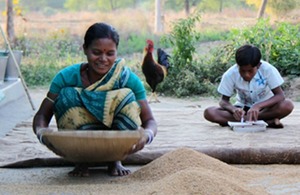Helping farming communities in India to improve their livelihoods
How a DFID-funded programme is helping poor rural communities in India to adapt to the effects of climate change

Tunu's wife sifts grain while their son studies his schoolwork. Picture: Diwakar Mani.
UPDATE: This case study was updated in November 2012
Tunu’s story
Tunu Sabar and his family are not afraid of hard work - the evidence is plain to see on his thriving and well-tended farm. His fields contain neat and plentiful rows of vegetables bordered by young mango trees, already flowering and promising a good crop of fruit.
Tunu takes a break from operating the foot pump which gives him access to the most valuable commodity and the key to life - the water which lies several metres underground. The technology seems basic but it works. In addition to the environmental benefits, the farmers of the area prefer them to more costly diesel pumps, as Tunu explains:
“I don’t have to spend any money on diesel to operate the pump and I can repair it myself. I don’t have to go to a mechanic. Earlier, I used local trees to help bring water from the well to my field, but I could only water a small portion. Today, my entire field receives water and my produce is much higher. My income has gone up significantly.”
A route out of poverty
Anyone meeting Tunu and his family for the first time would find it hard to imagine the journey they have made from hardship and hunger to the life they now lead. It is a journey out of poverty which has been shared by many of Tunu’s fellow farmers and villagers of Larki in the Indian state of Orissa.
The journey has been made possible by the state government’s Western Orissa Rural Livelihoods Programme (WORLP), funded by UK aid from DFID. WORLP had a different approach to previous government projects: it focused on improving people’s livelihoods rather than just soil and water conservation. It has been a great success - in four districts it has already helped 800,000 poor people, a number which DFID hopes will eventually rise to 1.5 million.
Today, thanks to WORLP, Larki is an oasis of flourishing agriculture in a dry and barren land. But just seven years ago, Larki was struggling to deal with a changing climate and the consequences of a 20-year drought. People’s earnings were meagre, not enough to feed themselves. Entire families would migrate to other states in India in search of work. At the heart of their struggle for survival was water, or the unpredictability of it. Without water, the land was near worthless.
Tunu remembers those days:
“Hardly any work was available here. We couldn’t irrigate our fields or grow crops. Most of us went to Hyderabad, Bhubaneshwar, even Surat to work in brick kilns or as labourers.”
Empowering communities
While addressing the fundamental need for food and water, WORLP puts the community - small farmers and landless labourers - at the centre of its work. It was the villagers of Larki themselves who chose who benefited from the project. The poorest, like Jamuna Sabar, a widow with almost no income, were given money to make a start on developing their land. She says:
“I got money from the project to dig a well, and they also gave us seeds and told us what crops to grow. Now we earn enough money. My son doesn’t have to go to other places for work. He can stay here and look after the family.”
Farmers like Tunu were given advice by WORLP on farming techniques, such as diversifying their crops to adapt to the changing weather, making them more resilient to climate change. The farmers of Larki are now self-sufficient and knowledgeable. They donate grain to a common grain bank which can be accessed by anyone who may need additional grain for their family. Hunger for many is a thing of the past.
Green and pleasant land
“These days the land is never left fallow. We know how to grow crops in small pieces of land,” Tunu says.
From a dry brown, Larki’s landscape today is a vibrant green. Four thousand hectares of land are under plantation in four districts. There are now 35 hectares of cashew trees and 15 hectares of mixed plantation on lands that were previously infertile. The land is criss-crossed with 60,000 water harvesting structures which help to prevent soil loss and recharge the ground water.
The impact on climate change has been overwhelming. The move away from diesel pumps and from burning cow dung, along with planting trees and building ponds and wells to recharge groundwater, has saved over 700,000 tonnes of carbon.
The bigger picture: Key facts and stats
UK aid has supported work across 6 Indian states to improve people’s livelihoods with:
- over 170,000 people lifted out of poverty
- improved disaster coping capacity for over 80% of farmers
- improved access to natural resources for more than 95% of poor people which means they are no longer lacking in basic food and water and have improved income.